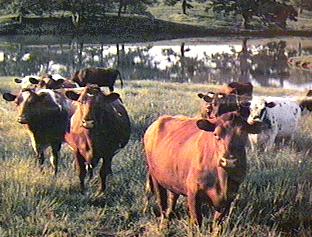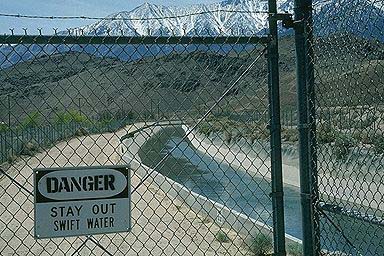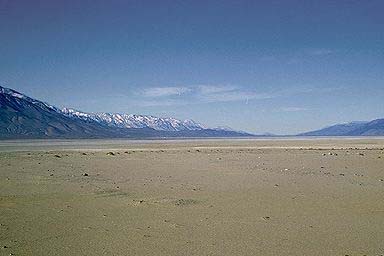Mad Cows, Englishmen,
Your Health,
and your Planet
~An Ode to Earth Day~
April, 1997
![]()
You may already acknowledge that a change in your diet might help your health. In this guest Editorial Mark Blackburn makes the point that your Planet's health would be improved, too. Mr. Blackburn discusses the latest findings of links between diet, health, and environment. He will participate in Saturday's Earth Day event sponsored by the City of Roseville at Maidu Park from 10:00 to 2:00. Come by and see Mark and other helpful volunteers at the EarthSave booth. He will have footnotes to this article, flyers, posters, and a crew of helpful volunteers who can make suggestions on a healthier lifestyle which will benefit the environment as well.
Mad Cows
Incredulity set in last month as the British Government finally caved in to overwhelming scientific evidence that at least 10 recent cases of an always fatal brain disease, CJD, could only have been caused by eating beef infected with "Mad Cow Disease." Unlike CJD's normal victims, all 10 cases involved adolescents or young adults, 8 of which have already died. This politically embarrassing admission confirms what many Brits have suspected since Mad Cow Disease first made headlines in the early 1980s--their government in collusion with wealthy farmers was lying to them. Indeed, eating the diseased beef (or byproducts such as milk and dairy products) is potentially, if not likely fatal.
Englishmen
Worse still, the disease has an incubation period of from 5 to 15 years. British subjects dying now may be just the first ripple in a wave of deaths. This tragedy hearkens back to the early 1980s when the disease ran rampant among cattle....cattle the British Government had assured its subjects were safe for consumption. Mathematical models projecting the number of British citizens already infected run as high as 1/2 million! This would rank as the most severe plague since...... the plague. Several radical "alarmists" have cautioned Brits all along that eating any beef was extremely hazardous. But, the paternal and "ever-so-benevolent" government, strongly influenced by powerful & wealthy farmers mocked, demoted, retired or silenced most of these prophetic "chicken littles." (That's prophetic as in bad-for-profits). In so doing, Britain's ministers have brazenly placed the interests of wealthy, campaign-contributing farmers well above that of the regular citizen, who has a right to be MAD as a Cow!

Politicians
Britain is on the brink of a crisis--A crisis of politics as much as a crisis of public health and economics. Just as here in socialized America, home of the "farm subsidy" programs for our "poor" farmers, Britain's government is heavily influenced by wealthy farmers. If the entire national herd is put to death--some 12 million animals, 30 billion dollars in compensation will be paid to British farmers. (What will dying humans get--forgiveness of their portion of future income taxes which support the farmer's subsidy programs)?
Coping with Realities
So what is happening with Britain's food culture? Milk consumption is down nearly 50% in the last five years. Beef consumption is way down. Large numbers of the population are avoiding eating any animal-based foods. About one half the teenage population are vegetarian. Here in the US teenage vegetarianism is also gaining adherents rapidly. What Britain is already seeing is a significant paradigm shift in eating habits. In the 1960s our US schoolrooms all had posters of the "four food groups" -- ever so selflessly supplied by the American Dairy Council. Whether advertising or brainwashing, such promotion had great effect! North American's diets consist of 40% fat, in contrast to China's 14%. In the US Heart attacks, cancer, osteoporosis, and obesity are so common, they are the norm, not the exception. In China, they are the exception. Yet for years, our government would label the Chinese diet inadequate & flawed when compared to ours!
Food Culture
I am not an animal rights advocate. I am a thinking man, however. In the mid-1980s after spending some time overseas, I studied nutrition. One thing you'll quickly find if you live overseas is that most other cultures eat very differently than we do. I found that in the rest of the world very little meat (animal products) were eaten. Calves drink cow's milk, and people, when young drink Mother's milk. After weaning, milk drinking stops entirely. Dairy products, eggs, and meat are rarely eaten outside certain westernized countries including the United States, Britain, Sweden, Germany, Australia, Argentina & New Zealand. Historically, the human race has subsisted on plant-based diets, cave-man lore and other Neanderthal braggadocio aside. In dozens of countries we look down upon as "backwards" like tiny El Salvador, or Pakistan, or Malawi, meat consumption is about 1/10 to 1/50th per capita what it is in the US. And, dairy product consumption is more often unheard of. However, their cancer and heart disease rates are also 1/10th what ours are! Our human bodies have the anatomical design and characteristics of a frugivore (fruit eater)---not a carnivore. Our digestive system is designed for an frugivorous diet. The opposing thumb of primates enables us as the only family able to peel and eat many fruits such as the banana. Eating meat or dairy products which are devoid of fiber slows our digestive processing. Meat and dairy foods putrefy quickly, but pass very slowly, loading us down with toxins. After an 11 year study of 2000 vegetarians and semi-vegetarians the German Cancer Research Center in Heidelberg said that people who eat little or no meat live significantly longer.
Diet and Disease
During this century, spurred by the advent of the refrigerator and farm subsidies (farmer welfare), North Americans have departed markedly from the diet traditionally eaten since the beginning of the human race. In 1985 we ate only half the grains we ate in 1900. We consumed 280% more chicken, 50% more Beef and 33% more dairy products. We essentially eat far more fat and protein, and markedly less fiber and complex carbohydrates--the true fuel of the human body. What is the result? The Surgeon General stated that nearly 70% of our diseases are diet-related. The US leads the world in heart disease, circulatory diseases, and cancer. The largest killer in the US is heart disease....a disease nearly unknown in many countries today which still eat a traditional low-fat plant-based diet. Other diseases which are caused by or linked to our unprecedented heavy consumption of meat and dairy products include allergies, appendicitis, arthritis, breast cancer, constipation, diverticulosis, chronic ear infections in babies, hypoglycemia, kidney disease, osteoporosis, prostate cancer, strokes, asthma, colon cancer, diabetes, gallstones, hypertension, impotence, obesity, peptic ulcers, salmonellosis, trichinosis tonsillitis, and varicose veins. Many of these diseases (profitable only to your doctor and the drug companies) simply do not occur in populations which continue eating a traditional human diet of plant-based foods. It's now wonder we have so many doctors practicing so much costly medicine. Add to these maladies the threat of Mad Cow disease, e. coli, and the downstream harmful affects of the drugs meat-eaters passively ingest through drugged farm animals, and you may wonder why anyone eats meat or dairy products at all.
![]()
Nowadays, meat, milk and eggs, the mainstay of the American diet, are getting hit from all angles. There is a certain similarity here to the public perception of tobacco smoking. Recall that back in the 1940s most doctors smoked. Many recommended smoking as good for the lungs in general, and, valuable as therapy for lung disorders. During my childhood in the 60s, we were told cigarettes would "stunt our growth." Now, as the recent billboards declare, "Can you tell me one good thing about smoking?" In the future will the public perception about eating meat become similar to what we now believe about smoking? Read on!
One of the good things about the freer flow of global information over the INTERNET is the opportunity to find out how life actually is in other countries. It is my hunch after doing considerable research that western civilization has been conned into eating expensive, unhealthy food not well suited to human consumption. All the while we have criticized many countries for being backwards because they eat only x number of calories from meat, we've been choking and gasping with atherosclerosis and cancer from eating way too much of it. Additionally, the quality of that meat has diminished greatly as factory farming has destroyed the old-style small family farms.
The evidence of the health hazards of eating a typical US diet are overwhelming. Your medical community rarely will share this with you, however. In fact, their "bread and butter" is to keep you eating white bread and butter! And cheese, and meat, and eggs. But let me share a few facts: Eliminating meat, fish, dairy and eggs from your diet reduces your risk of heart attack by an estimated 90%. US males have a 50% likelihood of dying from a heart attack. Pesticide contamination in human breast milk is 35 times higher for meat-eating mothers than for vegetarian mothers. Nutritional research has shown the true cause of osteoporosis to be consumption of too much protein, not a lack of calcium intake. The largest nutritional study ever undertaken, a study conducted in China under Dr. Colin Campbell confirms that animal-based protein is indeed dangerous. "Our study suggests that the closer one approaches a total plant-food diet, the greater the health benefit."
Although Mad Cow disease is presently very dramatic, eating healthy cows is not good for one, either. Expanding on the health reasons to not eat meat would be the topic of another editorial, however. In celebration of Earth Day, let's examine the effects on our Earth of eating an animal-based diet.
The Environmental Cost of a Hamburger
You may be unaware that 90% of the soybeans grown in the US are fed to livestock. Eighty percent of the corn is fed to livestock. So is most oats, rye, barley and sorghum. In the US livestock consume five times as much grain as do humans. In other words, while 20,000,000 people will die this year from starvation, our domestic livestock animals will eat enough grain and soybeans to feed over five times the entire human population of our country! The cost of producing meat obviously includes the costs of producing edible food fed to livestock. The efficiency is deplorable. If Americans would reduce their consumption of meat by a paltry 10% the grain which would have been fed to those animals would feed another 100,000,000 people, ending all global starvation!
Fuel Costs
It costs 78 calories of fossil fuel to produce 1 calorie of protein from beef. It costs only 2 calories of fuel to produce 1 calorie of soy protein. Why is this? The agricultural aspects of growing & supplying food to six billion animals grown for slaughter per year are unbelievable!
Imagine huge football field sized facilities all over the country packed tightly with wall-to-wall animals. These need to be heated in winter and cooled in summer. Dairy farms are massive users of energy. Transporting cattle to the feeding lot, then to the auction house, to the finishing lot, and then to the slaughterhouse is done with rigs that get about 1 mile per gallon, or with trains, also fuel-inefficient. At the slaughterhouse, the big energy demand starts until the meat is cooked: it must be frozen or refrigerated, and kept that way everywhere it goes. Grains, fruits, and vegetables, for the most part require no such refrigeration.
Land Costs
It takes 16 lb. of grain to produce 1 lb. of beef. We devote 64% of our US cropland to growing livestock feed...and 2% to growing all fruits & vegetables. Land used for growing all food for human consumption totals 60 million acres. The land used to grow all food fed to livestock is over 1.2 billion acres. Meat consumption is very costly in cropland. 1 acre of prime land will sustain (or create) 250 lb. of beef. Or, 5,000 lbs. of cherries, or 10,000 lbs. of green beans, or 40,000 lbs. of potatoes, or 60,000 lbs. of celery. Therefore, it requires about 500 times as much land to produce a pound of beef as a pound of produce.
Water Costs
| Crop | Gallons Required for 1 edible Pound |
| Tomatoes | 23 |
| Potatoes | 24 |
| Carrots | 33 |
| Grapes | 70 |
| Eggs | 544 |
| Chicken | 815 |
| Beef | 5,124 |

California Aqueduct
Water is a valuable commodity--particularly in California. See the chart above to understand how much more water is required to grow the "food" which kills people. (Recall that water is required not only for the animals to drink, but to water the crops which in turn they are fed). One pound of beef will require more water than showering 260 times for 5 minutes! No wonder the farmers lobby for taxpayer-supported water! Just in California, taxpayers foot a $24 Billion dollar per year subsidy. Otherwise meat would cost about $35 per pound (as it does in many other countries). If we ended the farm subsidies, real free-market pricing would greatly reduce the demand for meat, increase consumption of plant-based foods, and dramatically improve the health statistics and quality of life in America. Trillions of gallons of precious water are used each year raising livestock--more than is used by all other industries combined Enough water goes into the production of one steer to float a U.S. Naval destroyer!

Owens Dry Lake, California
What was once considered an almost endless supply of water, the Ogallala Aquifer is being robbed of 12 billion gallons a day to produce animal-based foods. Just fifty years ago it was considered inexhaustible. It is now estimated to be dry within 30 years, which will leave the great plains inhabitable.
Pollution
Of all our pollution problems, perhaps the most grave is that created by animal waste. One quarter million pounds of animal waste are created each second. That is 7.5 trillion pounds of excrement a year for which no sewage system exists. Most of it finds its way into our water. Ammonia contamination of water near farms from literally billions of gallons of urine is another environmental brouhaha. So, not only does animal farming consume more water than any other industry, it also contaminates it more than any other.
Rainforest Destruction
Because American's love of the burger goes on, vast areas of tropical rainforests have been cleared in central & south America for the purpose of raising even more beef. Destruction of these vital oxygen-creating zones disturbs a balance already upset by additional carbon dioxide created by six billion animals raised per year for no other purpose than to kill. Rainforests are probably Earth's most precious natural resource, being home to 75% of all living things. This destruction is costing us the extinction of about 1,000 species per year.
Factory farm animals have high levels of chemical toxins from a horrible lifetime of eating feed which has been sprayed heavily with pesticides. In fact, animal food products have nine times more pesticides than fruits and vegetables. Here in the US, independent estimates charged that 30% of our chicken is diseased with salmonella. Our own Department of Agriculture concedes that at least 25% is contaminated with salmonella. Topsoil erosion, clearing of forests, and desertification are serious threats, all caused to a large degree by our animal-based diet. The fall of many great civilizations was due in part to ecological considerations, including loss of topsoil. Many bloody battles were fought over obtaining arable land. The US soil conservation service says we are losing four million acres per year due to erosion. The chief cause (85% of it)---is, of course, the raising of livestock.
The Solution is Change
Change comes with difficulty. How many of us resist or at least are uncomfortable with change to our home or work environments. A change in diet is a very difficult one to make. Some of the people I know who have successfully changed their diet have done so out of dire desperation. Others enjoy the cost-savings, simplicity, better health, and freedom from obesity. Imagine if Great Britain rids herself of beef farming. She could sustain a renaissance of environmental and individual health, which could point the way for the US. I
If you are interested in the health benefits or environmental benefits of eating a more traditional plant-based diet, or simply want more information, here are some excellent sources: 2 Books: The McDougall Plan by John A. McDougall, M.D.; and, Diet for a New America by John Robbins (a bestseller). McDougall's book is more scholarly with hundreds of footnotes & references to medical journals. Robbins' book is more "hip," but both should be required reading. Also, EarthSave of Sacramento 1-800-425-1608, is a non-profit organization which offers support and encouragement for moving to a plant-based diet for health and environmental reasons. They have particularly good flyers and educational materials. You can visit them at Saturday's EarthDay Event at Maidu Park (see the special insert in today's Press Tribune).
Lastly, for the well-connected cyber-types, try http://www.Vegan.org and begin surfing.